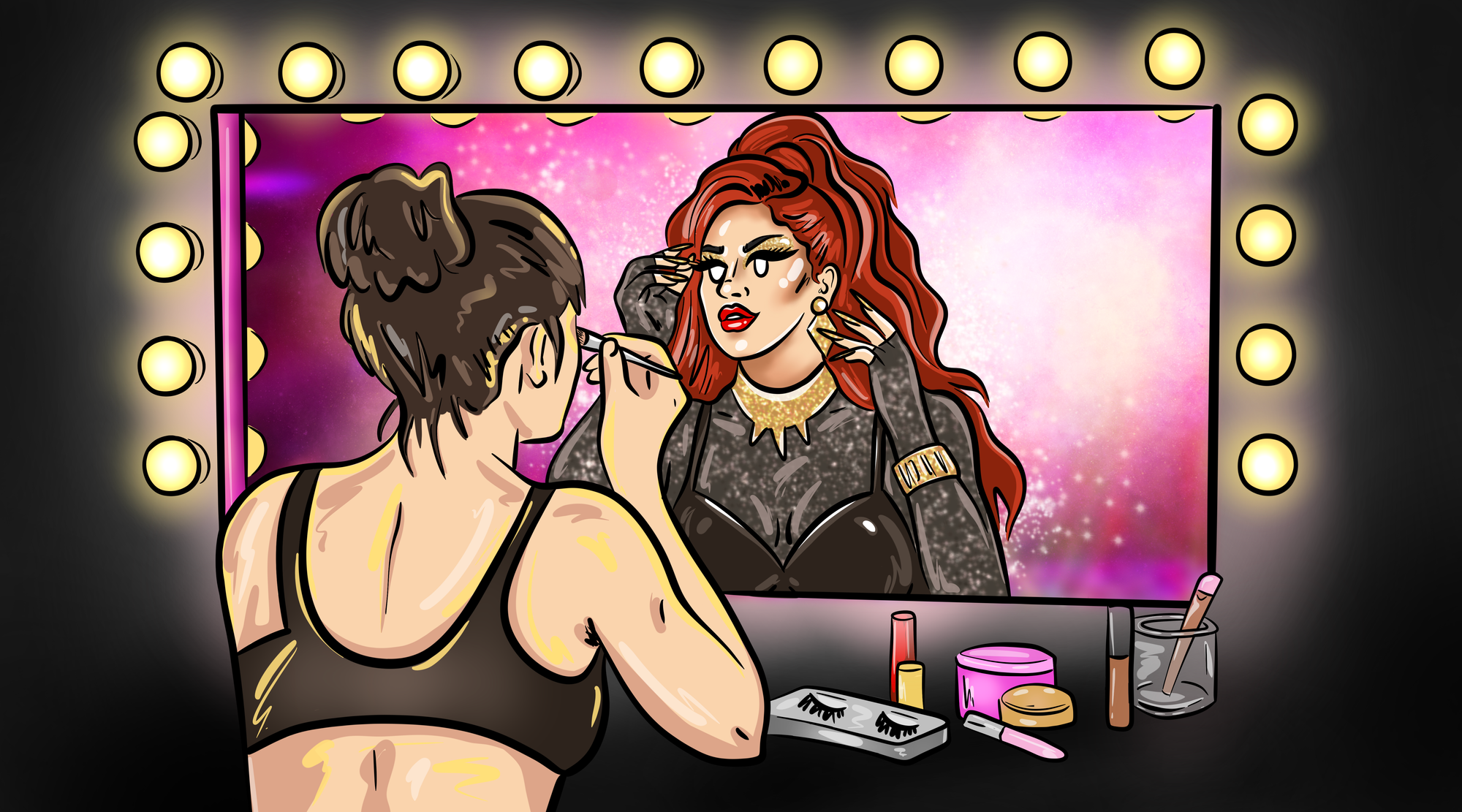I use the label ‘FTM’ (female to male) to describe myself in almost all of my online content. It's even part of my username and profile names on social media.
In my daily life, I don't use the term, and I embrace a lot of the criticism of it, which I'll get into, but as a sex worker some of these questions become a bit more complicated. I touched on this in my article about fetishisation—that as sex workers the rules are different—we sometimes allow and invite ways of being perceived that are distinct from preferences we might have in our personal lives.
Trans people have been around forever, despite what many right-wing anti-trans campaigners may claim; however, some of the terms we use are relatively new. ‘FTM’ has a comparatively longer history: a San Francisco-based newsletter for FTMs was started in 1987; FTM Trans Pride was celebrated there in 1994; a flyer from 1990 advertises a meetup for an ‘F2M Fraternity’. Google’s N-gram viewer shows that usage peaked in the 1990s and has experienced a heavy decline since then. This is presumably because more terms have become available, and with more awareness come more possibilities for understanding ourselves in new ways.
One of the problems I have with the term FTM is that it feels very reductive. Did I go from female to male? Is it as simple as that? Was I born female? I'm uninterested in the debate about what makes a ‘biological’ man or woman. Anyone with more than a basic understanding of biology knows that it's not as binary as we're led to believe in primary school, and so the term FTM obscures those nuances.
One of the problems I have with the term FTM is that it feels very reductive.
There's also something strange about including 'female' in how I define myself. I embrace my femininity, but I'm not female. The most obvious alternative term would be 'trans man', which separates me from a cis man in a way that I'm comfortable with—because I am different from a cis man—without putting any emphasis on where I started. For me, the modifier ‘trans’ conveys more clearly and more accurately what Jacob Hale says for himself about FTM: that it aims to “disrupt the assumption that I am striving for ‘complete’ male embodiment.” In other words, I’m not cis, and I don’t want to be cis, and so I label myself in a way that highlights my transness—of which I’m proud—as well as centering myself as a man. Hale, writing in 2009, is satisfied with ftm for this purpose; trans man, for me, is more apt.
FTM centres the transition element of my identity, which also feels old-fashioned for me: I'm not transitioning anymore. My transition is over. It was over after I got top surgery, I guess, so why would I still label myself with something that implies that a process is still ongoing? I suppose for some trans people who are in the process of transitioning, it might be a positive thing to include the transitioning aspect of their life, but even then I would question why the 'female' bit needs to be there. Trans man can mean someone who is still transitioning or someone who has transitioned (in whatever sense), so it feels like that would be enough. This emphasis on the transition element of identity also carries with it an implication of medical transition that feels uncomfortable. Anyone who identifies as a man is a man; focusing too much on transitioning itself comes dangerously close to gatekeeping gender identities—so I’ll stress that anyone is free to use any words they like about themselves, regardless of whether they’ve transitioned medically, socially, or have just changed their own conception of their gender for themselves.
Many people use FTM without identifying as a man; for them, the abstractness of the acronym can be useful; the focus on the transitional aspect itself, rather than a fixed identity, may be the point. Although it is formed from ‘female’ and ‘male’, combining these can be seen as disputing, rather than reinforcing, the gender binary.
Many people use FTM without identifying as a man; for them, the abstractness of the acronym can be useful...
I will say as well that 'ftm' is used as a shorthand nowadays, especially when lowercase, and has a more abstracted meaning than 'female to male'; it obviously does stand for that, but I don't think everyone who labels themself 'ftm' necessarily means it as a stand-in for the full phrase. That's just one possible reason of many that someone might feel comfortable with the label, so my discomfort with it is my own, but for me it doesn't quite fit.
All of that said, as a sex worker, things are very different. As I discussed in my fetishisation article, there is often a need to put ourselves into boxes in order to be more searchable and more marketable. I don’t describe myself as ‘FTM’ to new people I meet in real life, but I describe myself that way every day on the various porn sites I use for advertising, because it’s what viewers search for when they’re looking for content with trans men. The difficulty, of course, is that by ascribing to these labels, I’m reinforcing them. I do tag my videos in other ways too: trans man, trans masc, trans male, queer, transgender, and so on, but I always use ftm as well.
In an ideal world, I’d be 100% comfortable with all the ways I use to describe myself, but under capitalism I’m thinking more about how to ensure my video gets enough views so I can continue to pay my rent. From the outside looking in, I see how this could be considered a double standard, but I think these two truths coexist: the label is unhelpfully reductive in my personal life; the label is helpfully reductive online. Maybe I’m making excuses for it—sure, I’m not thinking ‘female to male’ every time I type ‘FTM’, but if the shorthand excuse is unacceptable in daily life, perhaps it should be unacceptable here too.
I should be clear that although ‘FTM’ brings up connotations of porn for me, I’m biased in that respect, because that’s the context in which I use it. If someone refers to me—or even themselves—as FTM outside of a sex work setting, it can feel immediately jarring. But that’s very individual. I don’t want to imply that the connotation is innate or universal; it is not. The label came before its use as a sexual category, and many people use it for themselves in daily life, outside of any connection to sex or sex work.
The label is unhelpfully reductive in my personal life; the label is helpfully reductive online.
One issue that arises when I describe myself in this way is that it comes with implicit consent for other people to do the same. I feel comfortable using reductive terms like this about myself, because I understand the nuance, I understand that they’re not perfect, and I understand that they are less acceptable outside of porn. Sometimes, someone I’ve filmed with will ask me if I’m happy for them to use FTM in their caption or promo for our video. I say yes (and I appreciate the consideration), partly because it’s complicated to go into it all, and partly because I know that they need to market our video just as much as I do, and so those labels and hashtags are necessary for them as well.
Is it always problematic to use labels without approval or permission? For me personally, I avoid tagging videos with anything that feels fetish-y in a way that I have no right to make decisions about—so nothing to do with race, even where there are common porn categories. It feels reductive and wrong for me to buy into racialised descriptions of people, and for me to capitalise on that aspect of our video by tagging it in ways that could be searched by people with racist or objectifying intentions. It’s complicated because we all tag our videos, and I’m sure there are times that I’ve used descriptors for people that they might not apply to themselves, or might be uncomfortable if they saw: daddy, bear, hairy, etc. While these are categories that could be considered objectifying, they don’t carry the same weight of societal prejudice as the labels that potentially play into racism or transphobia.
It’s clear that there are no easy answers when it comes to labels and identity categories, and that decisions about how we describe ourselves are deeply personal and individual. While some people may feel at home with ‘ftm’, for a variety of reasons, others may not. Others still may resent the association I draw with porn categories, but my opinions are only mine, and are influenced by the experiences I’ve had up to this point—similarly to how many people reject identifiers such as ‘queer’, due to negative connotations from bullying.
Although in an ideal world we might be able to choose more specific ways of describing ourselves, ones that feel comfortable and accurate. I think the demands of sex work complicate the ways I’m able to label myself. Until we reach that ideal world where trans rights are universal, and where sex work is safer, I embrace the ambivalence around the phrase.
Are you a sex worker with a story, opinion, news, or tips to share? We'd love to hear from you!
We started the tryst.link sex worker blog to help amplify those who aren't handed the mic and bring attention to the issues ya'll care about the most. Got a tale to tell? 👇☂️✨




